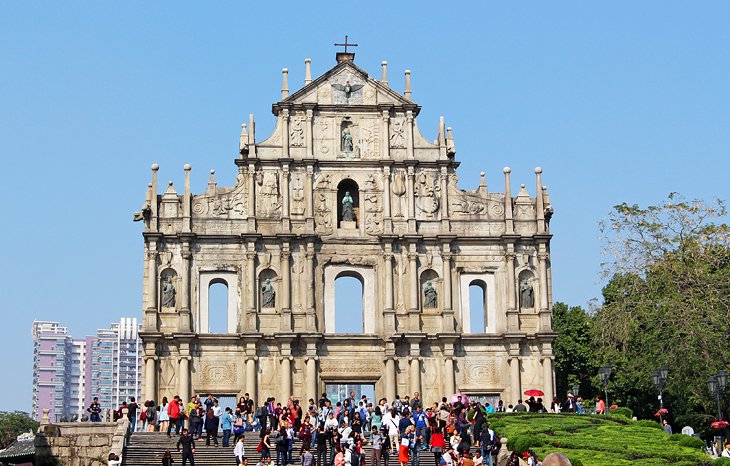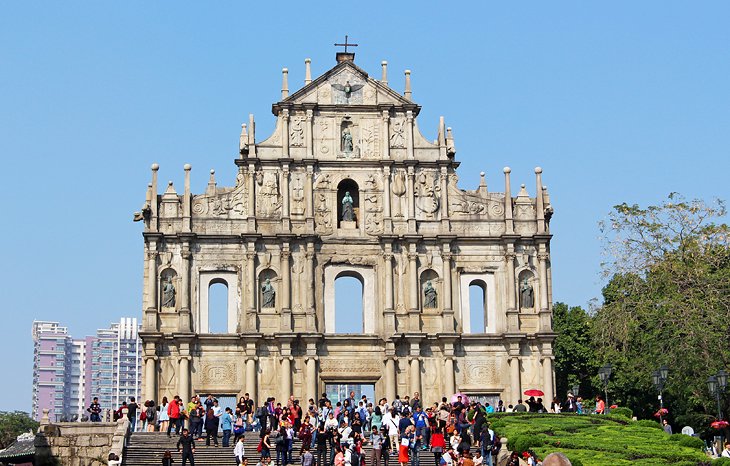
Macau, a Special Administrative Region of China, is a destination that defies easy categorization. For centuries, it stood as a Portuguese colonial outpost, a vibrant nexus where Eastern and Western cultures intertwined. Today, this legacy is etched into its architecture, its cuisine, and its very soul. Yet, Macau has also boldly embraced its future, transforming into a global entertainment hub, a dazzling cityscape of towering casinos and luxurious resorts that rival any on Earth. This intoxicating blend of history, culture, and modern spectacle makes Macau an irresistible magnet for travelers seeking a truly unique experience.
A Glimpse into Macau’s Rich History: From Trading Post to Global Icon
Macau’s story begins in the 16th century when Portuguese traders, seeking a foothold in the lucrative China trade, were granted permission to settle in the peninsula. For over 400 years, Macau served as a vital trading post and a gateway between Europe and Asia. This prolonged Portuguese presence left an indelible mark, evident in the charming cobblestone streets, the pastel-hued colonial buildings, and the distinct Sino-Portuguese fusion cuisine.

Related Articles about Macau: Where East Meets West in a Glittering Tapestry of Attractions:
- San Francisco: A City of Golden Dreams, Iconic Views, and Unforgettable Stays
- Phuket: The Andaman Pearl – Your Ultimate Travel Guide
- Ukraine: A Land of History, Culture, and Undiscovered Beauty
- A Tapestry of Timeless Wonders: Unveiling the Best Hotels and Experiences in Uzbekistan
- Germany: A Tapestry of Timeless Charm and Modern Marvels
The handover of Macau to China in 1999 marked a new chapter, but the unique cultural heritage was preserved under the "one country, two systems" principle. The city’s transformation since then has been nothing short of astonishing. Driven by the liberalization of its gaming industry, Macau has surged to become the "Las Vegas of Asia," eclipsing its American counterpart in gambling revenue. This economic boom has fueled a wave of development, creating a cityscape that is both a testament to its past and a bold vision for its future.
Macau’s Crown Jewels: Top Attractions That Captivate the Senses
Macau’s allure lies in its diverse array of attractions, catering to every taste and interest. From UNESCO World Heritage sites to pulsating entertainment districts, here are the must-see highlights:
1. The Historic Centre of Macau (UNESCO World Heritage Site): This is where Macau’s soul truly resides. Wander through its charming streets and discover a harmonious blend of Portuguese and Chinese architectural styles.
- Ruins of St. Paul’s: The iconic façade of the Church of St. Paul, a 17th-century Baroque church destroyed by fire, stands as Macau’s most recognizable landmark. The intricate stone carvings and the imposing silhouette against the sky are a photographer’s dream.
- Senado Square: The heart of the historic center, this vibrant square is paved with wave-like mosaics and surrounded by neoclassical buildings. It’s a lively hub for people-watching, shopping, and sampling local delicacies.
- A-Ma Temple: Dedicated to the sea goddess Mazu, this ancient temple dates back to the 15th century and is considered one of Macau’s oldest and most significant religious sites. Its serene courtyards and incense-filled air offer a tranquil escape.
- Monte Fort: Located atop a hill overlooking the city, this 17th-century Portuguese fort offers panoramic views of Macau and the Pearl River Delta. It also houses the Macau Museum, providing a deeper dive into the region’s history and culture.
- Chapel of St. Francis Xavier: A beautiful white chapel with a Baroque façade, this historic building is a testament to Macau’s colonial past and religious heritage.

2. The Glitz and Glamour of the Cotai Strip: This reclaimed land area is the epicenter of Macau’s modern entertainment scene, boasting lavish resorts, world-class casinos, and extravagant shopping.
- The Venetian Macao: This colossal resort is a replica of Venice, complete with canals, gondolas, and St. Mark’s Square. It offers an unparalleled shopping, dining, and entertainment experience.
- The Parisian Macao: Evoking the romance of Paris, this resort features a half-scale Eiffel Tower that offers stunning city views, particularly at night when illuminated.
- City of Dreams: A vibrant entertainment complex, City of Dreams is home to spectacular shows like "The House of Dancing Water" (a must-see water-based circus spectacular) and a plethora of dining and shopping options.
- Wynn Palace: Known for its opulent design and the mesmerizing performance of the Performance Lake with its synchronized fountains and lights, Wynn Palace offers a truly luxurious experience.
- Galaxy Macau: This integrated resort is a sprawling paradise with a man-made beach, a wave pool, and an array of world-class dining and entertainment venues.
3. Cultural Enclaves and Unique Experiences: Beyond the historic center and the glitzy resorts, Macau offers more intimate cultural experiences.
- Taipa Village: This charming Portuguese-style village on Taipa Island provides a more relaxed atmosphere. Explore its narrow streets lined with traditional houses, boutique shops, and excellent restaurants serving authentic Macanese cuisine.
- Macau Tower Convention and Entertainment Centre: For thrill-seekers, the Macau Tower offers adrenaline-pumping activities like bungee jumping, skywalk, and skydrop from its impressive height. The revolving restaurant at the top provides a unique dining experience with spectacular views.
- Fisherman’s Wharf: This entertainment complex is themed around various international ports, offering a diverse range of restaurants, shops, and attractions, including a replica of a Roman amphitheater.
Navigating Macau: Essential Travel Tips for a Seamless Journey
To make the most of your Macau adventure, consider these practical tips:
- Visa Requirements: Depending on your nationality, you may need a visa to enter Macau. Check the latest regulations with your local Chinese embassy or consulate.
- Currency: The official currency is the Macanese Pataca (MOP). However, Hong Kong Dollars (HKD) are widely accepted, often at a 1:1 exchange rate. It’s advisable to carry some MOP for smaller purchases.
- Language: The official languages are Portuguese and Chinese (Cantonese). English is widely spoken in tourist areas, hotels, and casinos.
- Connectivity: Wi-Fi is readily available in hotels, cafes, and public areas. Consider purchasing a local SIM card for uninterrupted connectivity.
- Etiquette: While Macau is a blend of cultures, general politeness and respect are appreciated. When visiting temples, dress modestly.
- Tipping: Tipping is not customary in Macau, but it is appreciated for exceptional service.
Where to Rest Your Head: Accommodation Options to Suit Every Budget
Macau offers a vast spectrum of accommodation, from opulent five-star resorts to charming guesthouses.
- Luxury Resorts (Cotai Strip): For an immersive experience in the heart of the entertainment district, consider hotels like The Venetian, The Parisian, Wynn Palace, or Galaxy Macau. These offer world-class amenities, fine dining, and direct access to casinos and attractions.
- Boutique Hotels and Heritage Stays (Historic Centre/Taipa Village): For a more intimate and culturally rich experience, explore boutique hotels or converted heritage buildings in the historic center or Taipa Village. These offer character and a glimpse into Macau’s past.
- Mid-Range Hotels: Numerous mid-range hotels are scattered throughout the city, offering comfortable and well-equipped rooms at reasonable prices.
- Budget-Friendly Options: While less common, some hostels and budget hotels can be found, particularly in less touristy areas.
Getting Around Macau: Efficient Transportation to Explore the City
Macau’s compact size makes it relatively easy to navigate.
- Free Shuttle Buses: This is arguably the most convenient and cost-effective way to get around. Major casinos and resorts operate free shuttle buses connecting their properties to ferry terminals, border crossings, and key tourist attractions.
- Taxis: Taxis are readily available and metered. They are a convenient option for reaching specific destinations, especially at night.
- Public Buses: Macau has an extensive public bus network that connects different parts of the peninsula and islands. They are an affordable option but can be crowded.
- Trams: While not as extensive as in some other Asian cities, a few tram lines still operate, offering a nostalgic way to see some parts of the city.
- Walking: The historic center of Macau is best explored on foot. Many attractions are within walking distance of each other, allowing you to soak in the atmosphere.
The Perfect Time to Visit: Embracing Macau’s Seasons
Macau enjoys a subtropical climate with distinct seasons.
- Spring (March to May): This is an ideal time to visit. The weather is pleasant and mild, with average temperatures ranging from 20-25°C (68-77°F). Expect occasional rain showers.
- Summer (June to August): Summers are hot and humid, with temperatures often exceeding 30°C (86°F). This is also the typhoon season, so be prepared for potential disruptions. However, indoor attractions remain unaffected.
- Autumn (September to November): This is another excellent time to visit. The weather is dry and comfortable, with cooler temperatures and plenty of sunshine. It’s a popular period for festivals and events.
- Winter (December to February): Winters are mild and pleasant, with average temperatures around 15-20°C (59-68°F). It’s a great time for outdoor exploration without the intense heat.
Beyond the Neon Lights: Experiencing the True Essence of Macau
While the casinos and mega-resorts are undeniable draws, Macau’s true magic lies in its ability to transport you through time and across cultures. It’s in the aroma of almond cookies wafting from a bakery, the echo of Portuguese fado music from a hidden bar, and the serene contemplation offered by ancient temples. Whether you’re a history buff, a foodie, a gambler, or simply a curious traveler, Macau promises an unforgettable journey where the past and present dance in perfect, glittering harmony. So pack your bags, open your mind, and prepare to be captivated by this extraordinary pearl of the South China Sea.





